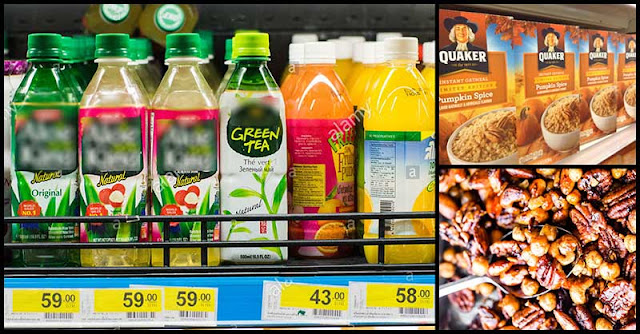Nowadays, so many “health foods” are present in the shelves of grocery stores. Many of them are labeled with “low-fat,” “organic,” “all-natural,” and “fiber-rich.” Are these foods really healthy? Can they promote long-term health improvement?
There are many marketing techniques that can lead us to think that these foods would be a great addition to our diet. But the truth is, they have lots of sugars, sodium, oil, etc.
Here is the list of foods that many people think are healthy, but actually are not:
“Candied-Up” Trail Mixes
Trail mixes bought in the store contain sugar, salt, chocolate bits, yogurt-covered fruits, and additional oils. These all add huge amounts of calories to an already calorie-rich snack.
We can make our own trail mixes so that we can control portions and the ingredients to be added. We can blend raw or dry-roasted nuts with dried cranberries or raisins at home.
Instant Oatmeal
Instant oatmeal lacks proteins, fatty acids, fiber, minerals, and vitamins that are present in whole grains. This is mainly due to the processes involved in its production, which helped improve its texture and cook it quicker. In Addition to this, additional flavorings (flour and added sugar) that are known to be unhealthy.
Diet Sodas
Because of its fewer calories and zero sugar, many people think that diet soda is a healthier version of soda. But the truth is, it contains aspartame, an artificial sweetener that can have dangerous effects on our health like seizures, depression, multiple sclerosis, headaches, dizziness, and even cancer. Consumption of diet sodas won’t even help us lose some pounds.
Agave Nectar
Agave nectar is derived from agave plants and is used as a substitute for sugar. It is believed to be healthier because its’s natural. The truth is, it undergoes rigorous processing and its resulting sweetener is highly condensed and contain 70 to 90% fructose.
Eating food high in fructose increases our risk of various diseases like Type 2 diabetes, metabolic syndrome, and cardiovascular diseases.
Veggie Spreads and Dips
Veggie Spread and dips may contain greens such as cucumbers, artichoke, and spinach. However, it does not mean that it’s a healthy option for our consumption. These may contain cream cheese, mayo, sour cream, and other types of cheese which have no benefits on our body.
Some healthy alternatives we can try are basil pesto, sweet onion deep, cashew kimchi dip and bean-based dips.
Deli Meats
Deli meats include ham, roast beef, sliced turkey, salami, and many more. These meats are prepared for a sandwich and other light dining options. However, deli meats are often packed with saturated fats, nitrates, sodium, and fillers wherein studies have found to be harmful to our health.
Bottled And Store-Bought Fruit Juices, Smoothies
Stored-bought and bottled smoothies or fresh juices are highly processed, contains artificial sugars, and may increase our risk of various diseases including diabetes. During the processing method, the fruits’ essential nutrients – vitamin C, fiber, and calcium – are stripped off.
Whole-Wheat Bread
According to experts, the consumption of whole-wheat bread can raise blood sugar more than most candy bars. As compared to the wheat milled from tall, flowing grains, modern wheat contains much higher gluten content. This can cause allergies, sensitivities, diabetes, heart disease, thyroid diseases, and joint pain.
Pretzels
Pretzel is a snack that is not filling in a satisfying way. Eating of this could lead to the consumption of too many empty carbs. Plus, our body’s sodium totals can also rack up if we eat a lot of pretzels. It would be better if we look for a more satisfying snack.









